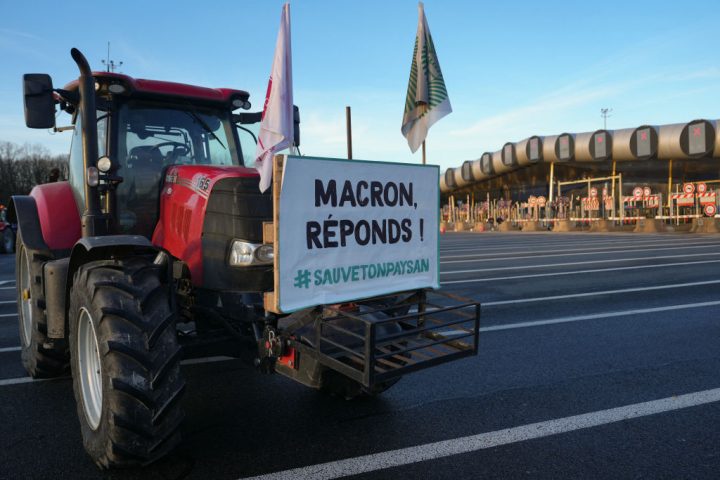Paris will be under siege from 2 p.m. today as farmers intensify their protest action and attempt to cut off the capital from the rest of France. They have announced plans to blockade all roads leading to Paris with their tractors, a threat that prompted interior minister Gérald Darmanin to summon police chiefs to his office on Sunday.
Darmanin ordered them to ‘deploy a major defensive operation’ to ensure the farmers are not successful, particularly in their ambition to prevent access to airports and the international food market at Rungis. Prime minister Gabriel Attal had hoped he’d defused the anger of the agricultural industry on Friday when he travelled to the Haute-Garonne region in the south, where the protests began ten days ago, with a list of concessions.
The farmers’ wail of despair echoes through the provinces where deindustrialisation has devastated large swathes of France
The diminutive Attal, dwarfed by the farmers he courteously confronted, said that he understood their anger and reiterated what he’d said earlier in the week about farming being a ‘source of pride for France’. Much of what Attal promised was financial: an end to the rising cost of diesel fuel used for farming machinery (a result of tax breaks on the fuel being scrapped) and an emergency fund for cattle farmers.
His words were enough to lift the blockade on the A64, the motorway west of Toulouse, but they’ve had little effect on the rest of the country’s demoralised farmers. ‘We need to go further,’ said Arnaud Rousseau, president of the powerful FDSEA union. One of his regional representatives, Lucie Delbarre, meanwhile declared: ‘We have a government that doesn’t care about its farmers…it’s a pressure cooker ready to explode.’
Amid Attal’s rhetoric and suggested measures there was not one word about Europe, the source of much of the farmers’ anger. The EU’s decision to suspend quotas and tariffs on imports of Ukrainian chickens and cereals into Europe is seen as driving the farmers’ prices down, and they also fear the consequences of the trade deal signed last year between Brussels and New Zealand.
Even as the farmers were protesting last week, the EU signed off a trade deal with Chile, which will facilitate the importation of raw materials and fuels such as lithium, copper and hydrogen into the European Union. The deal was described by the European Council on Foreign Relations (ECFR) as strengthening ‘Europeans’ place in the “à la carte” world.’
Tell that to French farmers. FDSEA were opposed to the trade deal from the start, with a spokesman complaining that ‘as always, agriculture and its most sensitive sectors have been the currency of the latest negotiations’. They predict that Chilean exports will saturate the French market with 9,000 tonnes of pork each year, 4,000 tonnes of lamb and over 30,000 tonnes of poultry.
What particularly enrages French farmers is the fact that they are subjected to ever more bureaucracy such as restrictions on animal feed, veterinary medicines and the use of phytosanitary products. Meanwhile, the same regulations don’t apply to farmers from Chile, New Zealand or Ukraine.
I live in a village in Burgundy and my neighbour is a cereal farmer who has recently turned organic. His family have farmed the land for decades and he is fully behind the protest movement. Why in particular? I asked him at the weekend. Too much administration and too many imports from the east, by which he meant Ukraine.
A few miles down the road is a livestock farmer from whom I buy milk each week. Bureaucracy is the bane of her life, too – she was one of the farmers who protested last week outside the local prefecture. She will be participating in the blockade of Paris this week.
She and my neighbour have little affection for the EU but their real anger is directed towards their own government. ‘They’ve gone along with Brussels,’ says the cereal farmer. ‘Rather than sticking up for us.’
Recent opinion polls have found that an overwhelming majority of people support the farmers’ protest. Some commentators wonder if a blockade of Paris might be counter-productive and drain away much of this goodwill. The farmers don’t care if they upset Parisians. Such has been the decimation of the agricultural industry this century, there is a feeling among them that this is their last chance to save their way of life. ‘We’ve got nothing left to lose,’ is a refrain heard often among protestors.
It is not just farmers who feel this way. Their wail of despair echoes throughout the provinces where deindustrialisation has devastated large swathes of the country. This is why the government is so worried. What began as a farmers’ revolt could easily spread into something far greater.
On a trip to Denmark in 2018, Emmanuel Macron mocked provincial France for being ‘Gauls who are resistant to change’. It was their refusal to embrace his economically liberal world view that frustrated the president. He subsequently laughed off his remarks, telling journalists that he loved France and its people. ‘I think what our neighbours, partners and friends want to see is a France that is proud of itself and knows how to look hard at itself and history and the transformations under way.’
They have looked hard at the transformations imposed by Paris and Brussels – and they don’t like them. The Gauls’ pride is on the line and they intend to fight for it to the bitter end.







Comments